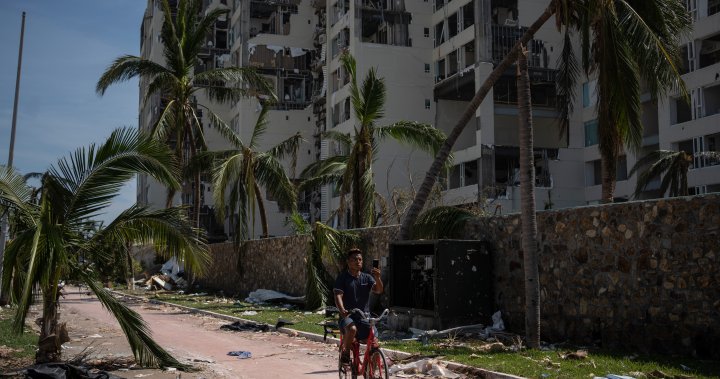The number of people dead and missing due to Hurricane Otis, a Category 5 storm which hammered the Mexican Pacific resort city of Acapulco last week, has risen to nearly 100, authorities in the state of Guerrero said on Monday.
Otis battered Acapulco with winds of 165 miles per hour (266 km per hour) on Wednesday, flooding the city, tearing roofs from homes, hotels and other businesses, submerging vehicles, and severing communications as well as road and air connections.
Looting broke out as the city’s population of nearly 900,000 became increasingly desperate for food and water.
Evelyn Salgado, governor of Acapulco’s home state of Guerrero, said 45 people were dead and 47 others were missing.
On Sunday, Mexico’s federal civil protection authorities said there were 48 dead, comprising 43 in Acapulco and five in nearby Coyuca de Benitez. Among the dead are a U.S. citizen, a Briton and a Canadian, according to Guerrero’s government.

Many residents of Acapulco were still struggling to pick up the pieces of their shattered lives on Monday afternoon.
Sixty-two-year-old Rumualda Hernandez from the Renacimiento neighborhood a few miles back from the shore, urged the government to send help after walking 10 blocks from her wrecked home to get water from a cistern to wash clothes caked in mud.
“I was trembling with fear,” Hernandez said, recalling how the floodwaters at her house surged above head height as the storm raged. “I thought I was going to die.”
Fishermen and workers on tourism yachts gathered at Acapulco’s Playa Honda on Sunday afternoon to look for missing colleagues and friends, worried officials were not doing enough.
Luis Alberto Medina, a fisherman, said he was searching for six people who worked in the harbor.
“It was really horrible,” Medina said. “We’ve already found the bodies of others.”

Governor Salgado provided updated figures on the phone with President Andres Manuel Lopez Obrador, who during a regular government press conference urged local authorities to ensure that basic goods were being delivered to Acapulco’s population.
The cost of damage from the hurricane could climb as high as $15 billion according to estimates, and Mexico has sent some 17,000 members of the armed forces to keep order and help distribute tons of food and supplies in Acapulco.
ATM machines have also been hit in the city.
Two service points will be set up in branches of an armed forces development bank in Acapulco to enable people to withdraw cash, the finance ministry said on Monday.

Access to food and water remains challenging, and retail group ANTAD on Monday urged the government to step up efforts to prevent looting at stores run by its members. Members include Soriana and Chedraui.
“We condemn acts of robbery by the population,” ANTAD said in a statement. “There is no justification for it.”
A line of some 150 people waiting for water provided by a local authority snaked down muddy streets in the La Frontera neighborhood on Sunday afternoon, as residents holding empty water containers bemoaned the hours-long wait.
“Look how many of us there are,” said one of them, Emilia Rojas, looking around her in despair. “We’re so many. This water isn’t going to be enough.”

On a nearby street, Perla Rubi said the long wait was uncomfortable, given how desperate people were.
“We’ve been here since dawn, since five in the morning, risking getting robbed, because now they’re assaulting people in the streets,” she said. “Where’s the government help?”
The disaster struck Acapulco barely seven months before Mexico’s next presidential election, and Lopez Obrador on Monday reiterated his claim that critics were attacking his response to Otis and inflating its impact for electoral reasons.
His fiery denunciations sparked criticism that the president was downplaying the gravity of the disaster.
(Reporting by Jose Decavele; Additional reporting by Daina Beth Solomon and Isabel Woodford; Writing by Dave Graham; Editing by Jonathan Oatis, Tomasz Janowski & Shri Navaratnam)




